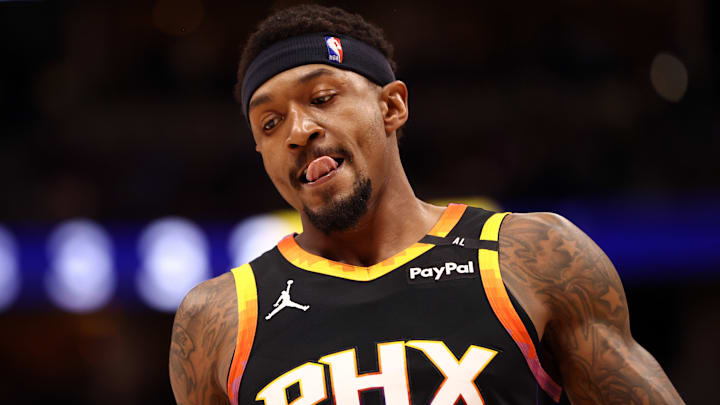The Washington Wizards signed Bradley Beal to a massive contract extension. The Phoenix Suns traded for Beal and will now carry all of that extension on their books for years to come despite Beal signing with another team. And if the Cleveland Cavaliers are not careful, they could be in the same boat with Darius Garland down the line.
Bradley Beal has been something of a punchline for the last couple of seasons, but earlier in his career, he was a gifted offensive star for the Wizards. He twice averaged over 30 points per game, something only a handful of players have done in NBA history. In his age-27 season, he made his third All-Star Game and his first All-NBA Team, landing on the third team.
That All-NBA selection made Beal eligible for a supermax contract, which the Wizards offered and Beal signed. What's more, that contract contained a no-trade clause, a rare benefit that ensured Beal had extreme control over his destination in any trade negotiation. Washington did absolutely nothing to negotiate a balanced deal with Beal, merely offering him everything they legally could.
That contract aged extremely poorly; Beal was in line to make over $53 million this season but was a low-end starter for the Phoenix Suns, shoehorned next to another on-ball scoring guard in Devin Booker. He was not able to scale into being the third option on the Suns, the team failed to launch, and the only way out that Phoenix saw was to agree to a contract buyout with Beal.
The Suns will waive and stretch his contract over the next five seasons, loading around $17 million per season onto their books for a player they cannot play and cannot trade. Beal already agreed to a deal with the LA Clippers.
The original sin for the Wizards was handing out a supermax contract to a guard who was good, but not Top-10 in the NBA -- and not particularly close. Yes, Beal made an All-NBA Team, which honors the 15 best players in the league that season, but with a number of players not being eligible or missing time due to injuries the back end of those teams are rarely acknowledging Top-15 players.
The next sin was on the Suns, who traded for Beal despite his mammoth contract and that debilitating no-trade clause. They locked themselves into a prison with few ways out, and that will scare off other teams from trading for expensive second-tier players in the future, especially given the ongoing pressures of the second tax apron era.
Enter Darius Garland and the Cleveland Cavaliers.
The Cavaliers have to avoid the same mistake
In his sixth season, Beal made his first All-Star Game, averaging 23 points per game on solid efficiency. In Garland's sixth season, which just concluded, Garland was an All-Star -- he averaged less points but on greater efficiency, better passing over Beal's improved defensive size.
Garland is currently eligible for a new two-year extension that would tack maximum money onto the end of his deal. He could also wait a year and try to make an All-NBA Team; he finished as fourth alternate last season, receiving second and third-team votes. He could realistically make it this season with a similar or slightly better campaign.
That would make Garland eligible for a supermax extension worth 35 percent of the salary cap, the same contract that Beal signed. He wouldn't be eligible for the no-trade clause unless he waited for his contract to fully end and signed a new deal -- you cannot add one to an extension -- but otherwise his deal would be equally onerous to Beal's.
You pay that amount for a superstar. The Golden State Warriors have no problems paying such a number for Stephen Curry. The Denver Nuggets gladly shell out the money for Nikola Jokic. The Oklahoma City Thunder just give Shai Gilgeous-Alexander that kind of money on an extension after winning MVP and leading his team to a championship.
For as underrated and talented as Darius Garland is, he is not on that level of player. He is not a Top-15 player in the NBA, even if he can thread the needle of having a strong season and being healthy enough to qualify. He can earn a contract that will be an overpay, and possible a significant one.
Given Garland's size, he may simply be too big (small) a target to play a star-level role on a championship team. Committing 35 percent of the cap to such a player, especially as Donovan Mitchell draws nearer to signing such a deal and Evan Mobley continues to improve, would cripple the Cavaliers' ability to maintain a championship roster. Yet teams will likely be extremely gun-shy about trading for a player like Garland is his deal is $70 million per season.
The Cavaliers love Garland, and rightfully so. Whether they work out an extension this summer or carry it into next year, they need to learn a hard lesson from the Bradley Beal disaster. They cannot just hand out whatever deal Garland is eligible for, as the consequences could be severe.
If they ignore this warning, they could find themselves in the same situation as Phoenix in just a couple of years. And that would be a grim future indeed.
